
Dear friend of FAI:
I’m excited to share with you our recent work at the Foundation for American Innovation. It’s been an energetic first quarter, as the FAI team continues to work on strengthening national security, improving American governance, and keeping America at the forefront of technological dynamism.
We recently enjoyed some recognition of that effort, making The Information’s list of the “Most Important Think Tanks for Tech to Know.” This publication caters to a high-visibility tech audience, an influential cohort increasingly interested in our work. The article notes that FAI “wants to see the government modernized partly with better technology,” and “plans to keep targeting the red tape it believes is hindering the development of expensive infrastructure such as data centers and nuclear plants.”
We were also pleased to host a special episode of our podcast, The Dynamist, featuring Y Combinator’s Garry Tan. Garry talked to Senior Fellows Evan Swarztrauber and Jon Askonas about the Little Tech agenda and the startups and smaller companies pushing for open standards, fair competition rules, and the right to innovate.
Last week, former FAI board member Michael Kratsios was confirmed as Director of the White House’s Office of Science and Technology Policy. I led a coalition letter to the Senate in support of his nomination, and we wish him the best in this role.
We’re excited to announce our new Conservative AI Policy Fellowship. The program is a six-week, part-time fellowship for conservative policy professionals in Washington D.C. seeking to understand AI and the policy debates surrounding emerging technology. Consider applying if you want to gain the tools and insights necessary to develop thoughtful and effective AI policies rooted in conservative principles.
Finally, we’re expanding the team. This quarter we welcomed Vice President for Policy James Wallner, Vice President of Operations Mark Shanoudy, Director of Outreach Rachel Altman, Senior Fellow Emmet Penney, Director of Policy Programs Sophia Brown-Heidenreich, and Research Fellow Ari Kagan. We also have a number of positions open—if you think you might be a good fit, please consider applying.
Research
Reports, Testimonies, and Letters
Chief Economist Sam Hammond testified before the House Science, Space, and Technology Committee, discussing how federal science and R&D can better support the private sector. He argued that a forward-thinking, less bureaucratic, and merit-based approach to federal science policy is key to maintaining U.S. technology leadership.
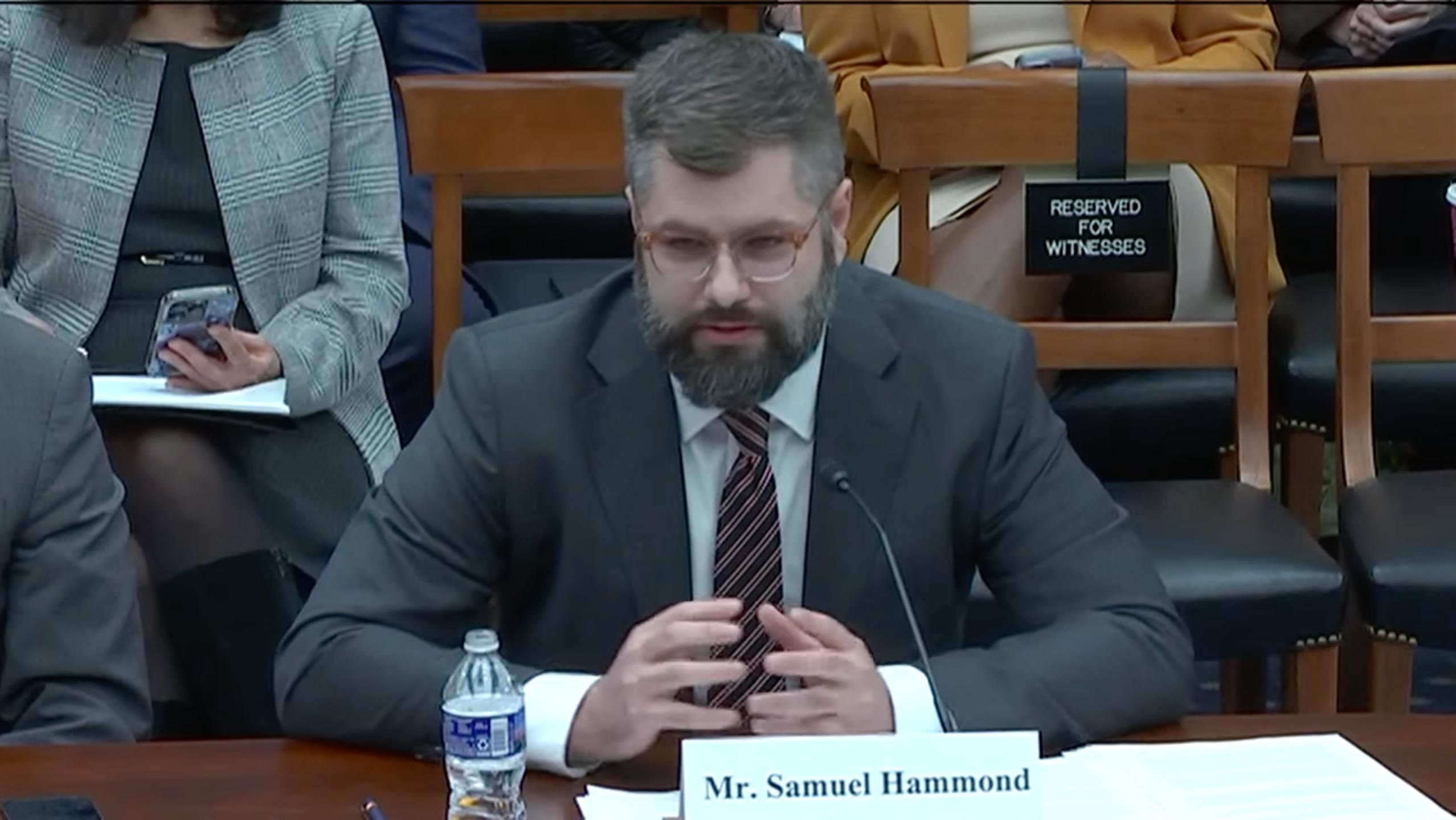
Research Fellow Josh Levine and Senior Fellow Tim Hwang published a report, “Copyright, AI, and Great Power Competition.” They consider copyright law’s impact on the future of American AI development and show why clarity around accessing data and training models under the fair use doctrine will be essential to ensuring America’s continued leadership in AI. Josh and Tim offer recommendations to promote AI innovation in the U.S. while mitigating concerns raised by rights-holders. The paper was the subject of a webinar with the Internet Archive featuring both authors.
Director of Infrastructure Thomas Hochman testified before the Utah House Natural Resources, Agriculture, and Environment Committee, arguing that House Bill 85 would modernize Utah's environmental permitting while maintaining strong environmental protections. The bill was signed by Governor Cox last week.
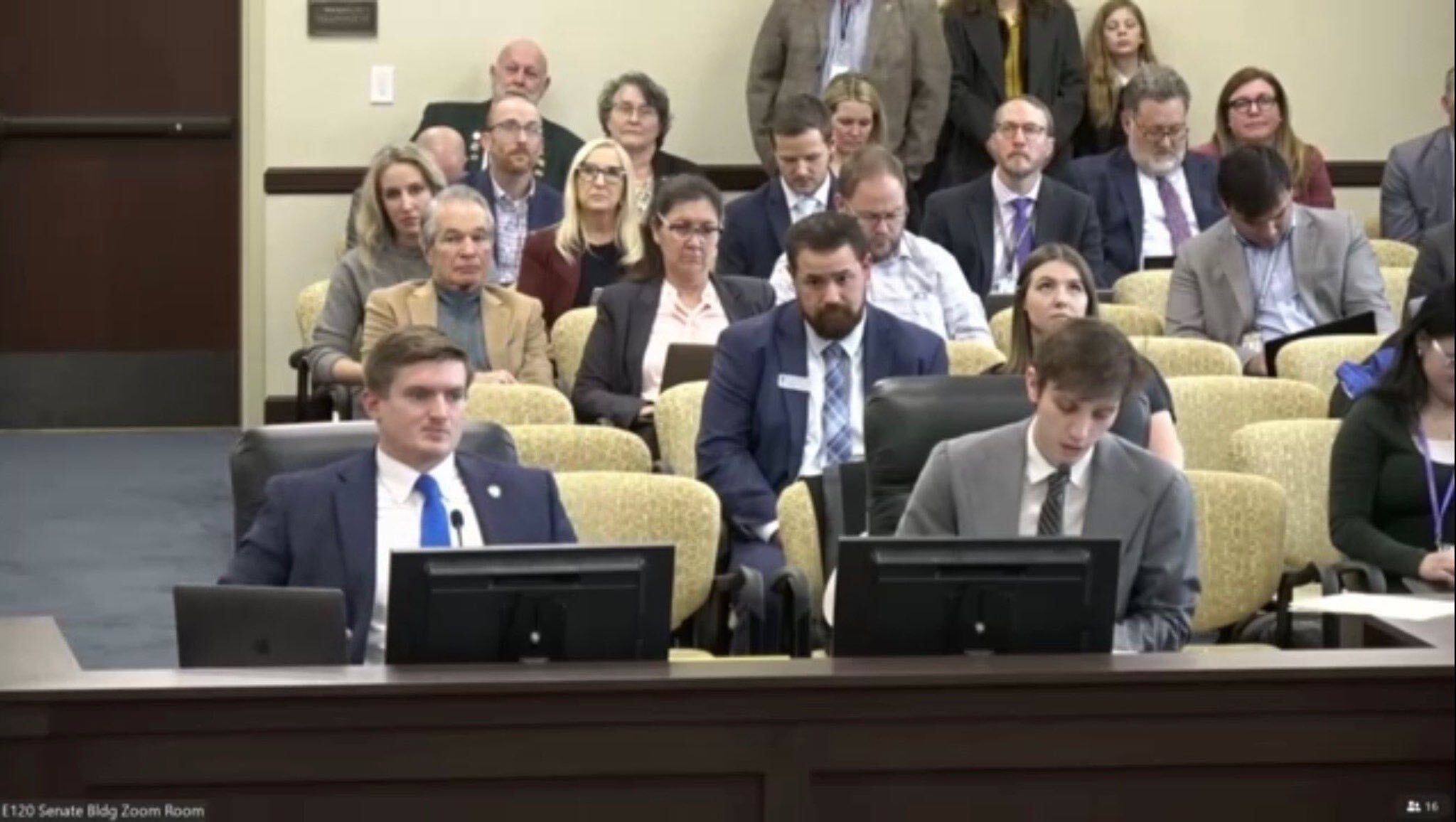
Thomas and the Institute for Progress’s Aidan Mackenzie published a paper, “How the White House Can Reform NEPA,” responding to President Trump’s executive action to streamline the National Environmental Policy Act. Thomas and Aidan offer recommendations to streamline NEPA while being careful to reasonably interpret the law.
Jon has helped launch A Future for the Family, which will serve as a hub for ideas and policy proposals to develop a pro-family tech agenda for the Right. Partners in the project include the Institute for Family Studies, the Ethics and Public Policy Center, and the Heritage Foundation. Recent efforts in the project include:
- A conference hosted by the American Enterprise Institute and the New Atlantis on “The Future of Conservative Technology Policy.” Managing Director for Policy Robert Bellafiore moderated a panel on “Scrolling Alone: Technology in the Home and the American Family,” and Jon spoke on a panel about “Progress for Whom? Family Stability, Good Jobs, and Economic Dynamism.”
- A report by Jon and Michael Toscano of the Institute for Family Studies for National Affairs on the relationship between technological change and family flourishing. They argue that if conservatives wish to restore the family as the foundation of our civilizational order, they must develop a comprehensive theory of technological change.
- A statement of principles published in First Things, calling for “A New Technology Agenda for the Right.”
Evan and Director of Technology Policy Luke Hogg published a paper, “On the Internet, No One Knows You're a Dog: Examining the Feasibility of Privacy-Preserving Age Verification Online.” They argue that modern verification technologies address the concerns raised by many critics of age verification policies, and show why policy debates about age verification must be informed by the latest advancements and not be hobbled by outdated assumptions that privacy and security are inherently at odds. The paper received a write-up in Politico’s Digital Future Daily.
Evan testified before the Office of the U.S. Trade Representative in support of USTR’s Section 301 investigation into China’s predatory subsidies and other market distortions in the semiconductor industry. He argues that USTR should address China’s aggressive, state-backed efforts to dominate the global silicon carbide wafer market.
Sam wrote a working paper with Justin B. Bullock and Seb Krier on “AGI, Governments, and Free Societies,” examining how artificial general intelligence could fundamentally reshape the delicate balance between state capacity and individual liberty that sustains free societies. They propose a governance framework emphasizing robust technical safeguards, hybrid institutional designs that maintain meaningful human oversight, and adaptive regulatory mechanisms.
In the New Atlantis, Jon contributed an essay on how the rise of protocols and networks helped usher in “The New Control Society.” The essay is the latest in his ongoing series for the New Atlantis, Reality: A Post-Mortem.
Senior Fellow Dan Lips and Robert published a report, “Leveraging R&D and Best Practices to Advance Innovation in Education,” on what state policymakers, school leaders, and parents can do to improve local education outcomes. They argue that capitalizing on the federal education R&D enterprise at the state and local levels will help America maintain its global standing and secure a thriving workforce amid dramatic technological change.
Thomas published a paper, “Building Baseload: Reforming Permitting for AI Energy Infrastructure,” on how permitting reform will be an essential part of unleashing AI in the U.S. He shows why regulatory barriers to energy infrastructure development present a challenge to the AI industry's growing power needs, and argues that the success of the AI industry in the coming decades will depend on how effectively policymakers can modernize regulatory frameworks while maintaining appropriate oversight.
Sam and Josh submitted comments in response to the National Science Foundation and Networking and Information Technology Research and Development Program’s request for information regarding the development of an AI Action Plan. Sam argues that competition with China, barriers to adoption in the real economy, and the sui generis nature of artificial general intelligence point to the importance and urgency of the AI Action Plan. Josh, building on his paper with Tim, argues that maintaining America’s lead in AI will require clarity on accessing data and training models under the fair use doctrine. Their comments were covered in Fortune.
Evan led a coalition letter in support of Gail Slater’s nomination as Assistant Attorney General for the Antitrust Division of the Department of Justice, arguing that she would bring a unique range of experience and expertise that will prove invaluable to the Department as it works to promote innovation and U.S. global competitiveness. The letter was covered in Politico Pro and Policyband.
Commentary and Impact
Policies that our scholars have advocated for saw progress this quarter.
We have highlighted the threat to innovation and competitiveness that a maximalist interpretation of copyright law with regard to accessing data to train AI models could pose, and we’re glad to see our argument gaining traction. Leading AI companies made similar arguments in their submissions to the National Science Foundation and Networking and Information Technology Research and Development Program’s request for information regarding the development of an AI Action Plan. Authors Alliance cited Josh and Tim’s paper in the same proceeding.
Utah Governor Spencer Cox's first executive order this session drew directly from our State Permitting Playbook to expand flexible permitting in the state. Our efforts with state legislators helped produce or advance several pieces of legislation, including:
- HB85 in Utah, as noted above, which expands flexible air permits and plantwide applicability limits. This legislation, which was signed by Governor Cox last week, will save tens of thousands of years of permitting time over the next decade while maintaining environmental protections. State Representative Tyler Clancy recently thanked Thomas by name for his help on this effort, calling him “truly one of the best scholars on permitting reform.”
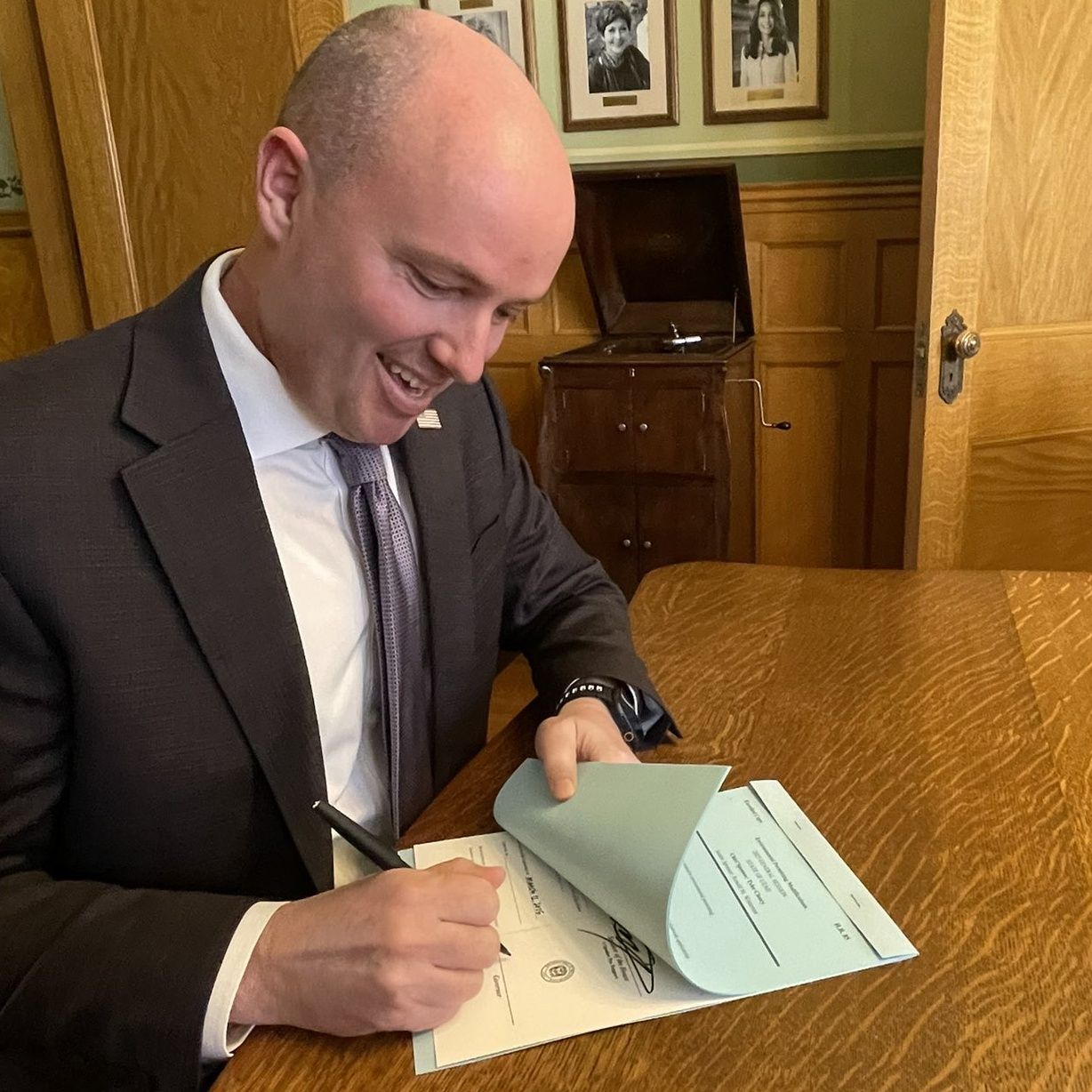
- AB527 in California, which exempts geothermal exploration drilling from the California Environmental Quality Act. Geothermal modelers have argued that the path to geothermal scale runs through California, making this bill important for the future of the industry.
- HB623 in Montana, which authorizes the siting of temporary nuclear fuel storage facilities in the state. This will be essential if Montana is to build nuclear power, as without this law, potential nuclear power operators would be stuck waiting for a national waste repository. This bill permits them to pursue the standard industry practice of storing their waste on site at the plant.
- Several others, including state NEPA reform in Montana (SB340) and flexible permit development in Arizona (SB1699).
We’re also excited by recent permitting reforms at the federal level. In early January, Thomas called for the Council on Environmental Quality’s regulations to be rescinded by executive order and replaced with streamlined guidance. On the first day of his second term, President Trump issued an executive order doing just that.
We’ve warned about the national security risks posed by drones built by Chinese manufacturers such as DJI and Autel. The Department of Commerce’s Bureau of Industry and Security issued an advance notice of proposed rulemaking requesting public comment on national security risks posed by foreign drones, especially those made in China. Additionally, DoD recently designated Autel a “Chinese military company.”
We were among the first to sound the warning about the growth in purchases of U.S. farmland near military bases by Chinese government-affiliated companies. President Trump recently signed a National Security Presidential Memorandum that calls for “promoting foreign investment while protecting America’s national security interests,” including by “protect[ing] our farmland and real estate near sensitive facilities.”
We were pleased to see the Government Accountability Office’s recent overview of the work done by its Science, Technology Assessment, and Analytics team, which I helped advocate for standing up.
Our commentary included the following:
- Luke Hogg, “Building a Better Internet,” in National Review
- Robert Bellafiore, “The Poverty of Progressive Abundance,” in Fusion
- Dan Lips, “Ohio Is Using AI to Cut Red Tape. DOGE Should, Too,” in City Journal
- Dan Lips, “A Solution for Cutting Government Waste,” in City Journal
- Sam Hammond, “U.S. Companies Are Helping China Win the AI Race,” at City Journal
- Kevin Hawickhorst, “The DOGE of the 1880s,” in the American Conservative
- Joshua Levine, “How To Promote Greater Competition for Cloud Computing,” in Discourse Magazine
- Joshua Levine and Luke Hogg, “Life, Liberty, and the Right To Shitpost,” in Reason
- Joshua Levine, “AI, Encryption, and Data Flows: Policy Imperatives for U.S. Leadership,” in the National Interest
- Dan Lips, “Make Foreign Student Exchange Great Again,” in the National Interest
- Robert Bellafiore, “A Good Word for National Libertarianism,” in Commonplace
- Robert Bellafiore, “On the Bubble,” in the Washington Free Beacon
- Kelvin Yu, “Technological Progress in Chinese Political Culture: An Intellectual Genealogy,” in American Affairs
- Joshua Levine, “To Preserve US AI Leadership, Congress Must Address Copyright,” in Tech Policy Press
- Luke Hogg and Joshua Levine, “Shein and Temu Must Be Restricted over Slave Labor,” in the Washington Examiner
- Robert Bellafiore, “The Scandal of Tech Criticism,” in Fusion
- Dean Ball, “Life, Liberty, and Superintelligence,” in Arena
- Dean Ball, “Restoring Leadership in Critical Minerals,” for American Compass
- Joshua Levine, “Getting the FACTs About Foreign Adversary Investment in Telecoms,” in Broadband Breakfast
- Sam Hammond, “The New Right Needs Conservative Eclecticism,” at tomklingenstein.com
- Keegan McBride, “The Trouble With AI Safety Treaties,” in Lawfare
- Dan Lips, “Preventing Fraud and Spending in Government Programs: An Interview with the Program Integrity Alliance’s Linda Miller”
- Dan Lips, “How Much Could DOGE Save by Implementing Inspector General Recommendations?”
- Roslyn Layton, “ITC Reform Can Advance the Trump Innovation, National Security, and Trade Agendas”
- Sam Hammond, “DeepSeek’s Success Reinforces the Case for Export Controls”
Our writers were also busy on their Substacks:
- At State Capacitance, Policy Analyst Kevin Hawickhorst wrote about plain language reforms in the 1950s, the Department of Agriculture’s reorganization, and how the Treasury tracked donations during World War II.
- At Green Tape, Thomas wrote about the Council on Environmental Quality’s authorities, state permitting efforts, and permitting wishlist for Congress.
- At Nuclear Barbarians, Emmet wrote about nuclear efforts in Illinois, industrial cathedrals, and environmental law and the left.
- At Second Best, Sam wrote about DOGE and more.
- At Hyperdimensional, Non-Resident Senior Fellow Dean Ball wrote about AI liability, the US AI Safety Institute, and the future of open-source.
Highlights among our media hits included the following:
- Sam spoke to the Washington Post and appeared on NBC to discuss Republicans’ internal fights over high-skilled immigration. He also spoke to the Washington Post about how DOGE will engage with the executive branch.
- Jon joined Dean’s new podcast, AI Summer, to discuss AI policy in the Trump administration, and Sam joined the same podcast to discuss how to get the government ready for AI.
- Jon’s work was cited in the New York Times regarding the “alliance between tech titans and the MAGA faithful.”
- James appeared on FOX Carolina to discuss President Trump’s many executive orders.
- Sam spoke to Bloomberg about the value of using a government blockchain to transparently track government spending as part of DOGE’s government efficiency efforts.
- Thomas was cited in Heatmap, E&E News, NOTUS, the Daily Caller, and other outlets regarding President Trump’s reforms to federal environmental laws.
- Dean joined C-SPAN’s Washington Journal to discuss Trump's AI infrastructure investments.
- Sam joined Canada’s Forum Daily News to discuss the future of supersonic travel.
Events
This quarter, we hosted events across the country with some of our favorite organizations and thinkers.
We partnered with Palladium magazine for a launch party in DC to celebrate their latest issue, Universal Man, and consider how space expansion will transform civilization and redefine humanity itself.
We partnered with Boom Supersonic and Y Combinator for a DC watch party for the Boom XB-1 test flight to break the sound barrier.
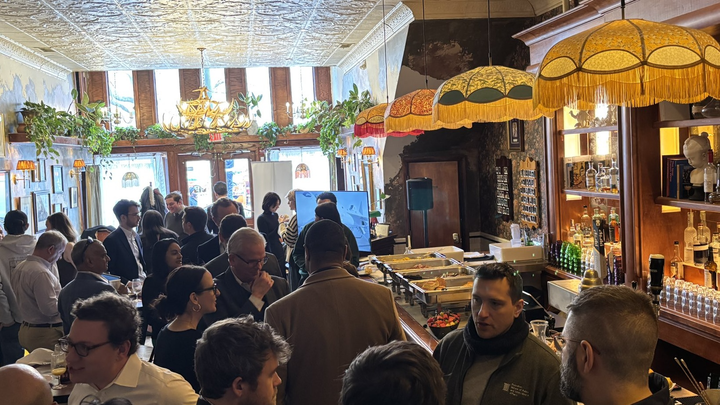
We partnered with the Frontier Foundation and Charter Cities Institute for a Freedom Cities Happy Hour to discuss the Freedom Cities initiative, a new approach to governance autonomy and urban development.
We hosted a salon dinner in DC to discuss opportunities for education reform in 2025 and the future of the federal education R&D enterprise.
In another salon dinner in DC, we discussed the future of competition in digital markets and what comes after the techlash.
We hosted a roundtable discussion with the CEO of a leading AI company and right-of-center think tank leaders.
We recently began hosting a monthly tech policy happy hour by the FAI office. The next one will be Thursday, April 17—we’d love to see you there.
We also hosted our first joint happy hour with the Institute for Progress at our office penthouse in DC.
Other highlights among the events our scholars spoke at included the following:
- At South by Southwest, Sam spoke on a panel with Eliezer Yudkowsky on “How To Make AGI Not Kill Everyone.”
- Thomas spoke on a panel at the American Enterprise Institute about how changes to infrastructure permitting could affect the economy.
- At the Knight Media Forum, Luke spoke on a panel about the promises of AI across the media landscape and ran a workshop on middleware and decentralized social media.
- Dan spoke about cybersecurity deterrence, DOGE, and program integrity reforms at the Better Identity Coalition’s event Identity, Authentication and the Road Ahead 2025.
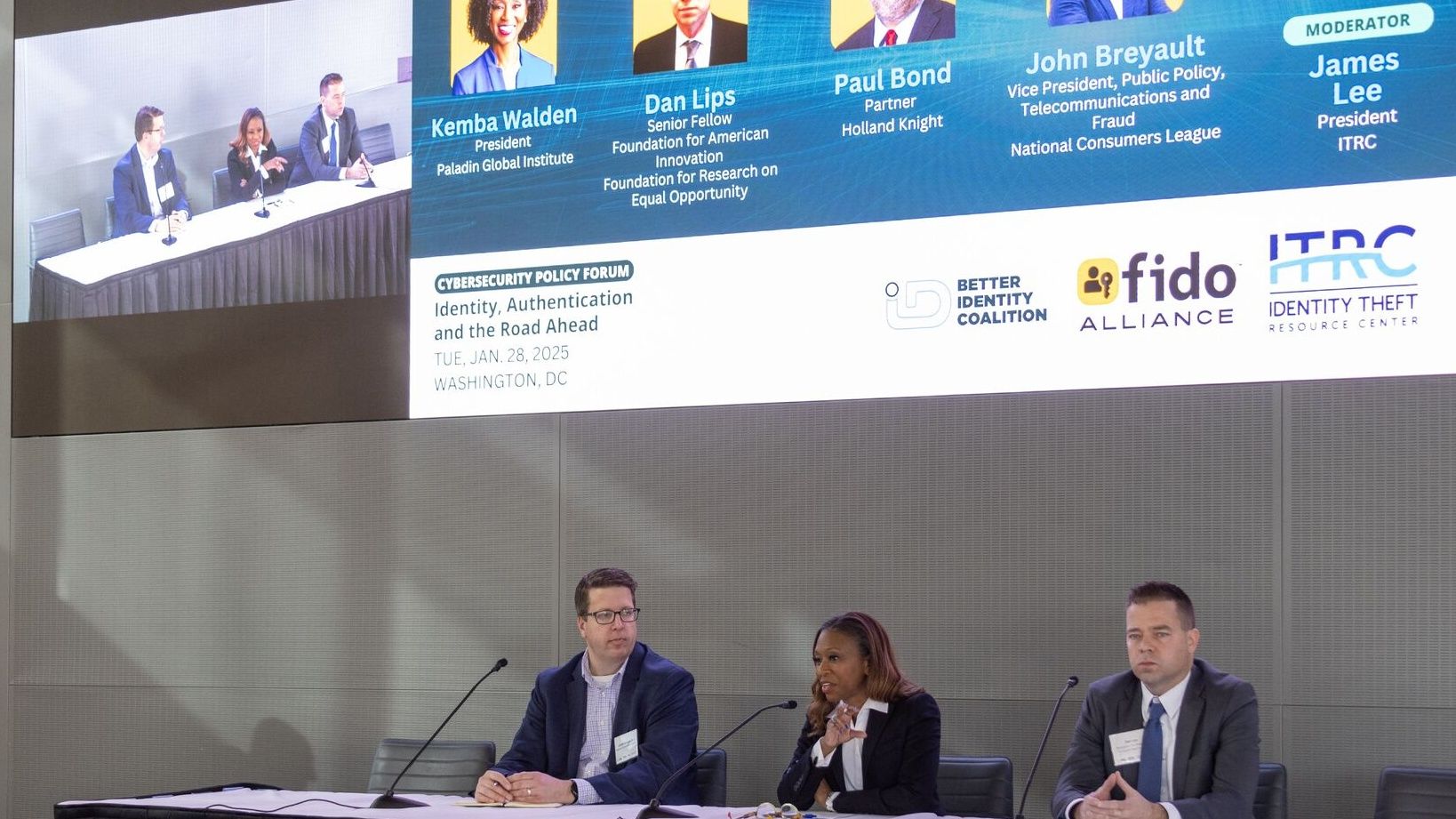
- Evan joined a panel to discuss “The Future of Tech Policy in the 119th Congress,” hosted by the Congressional Internet Caucus.
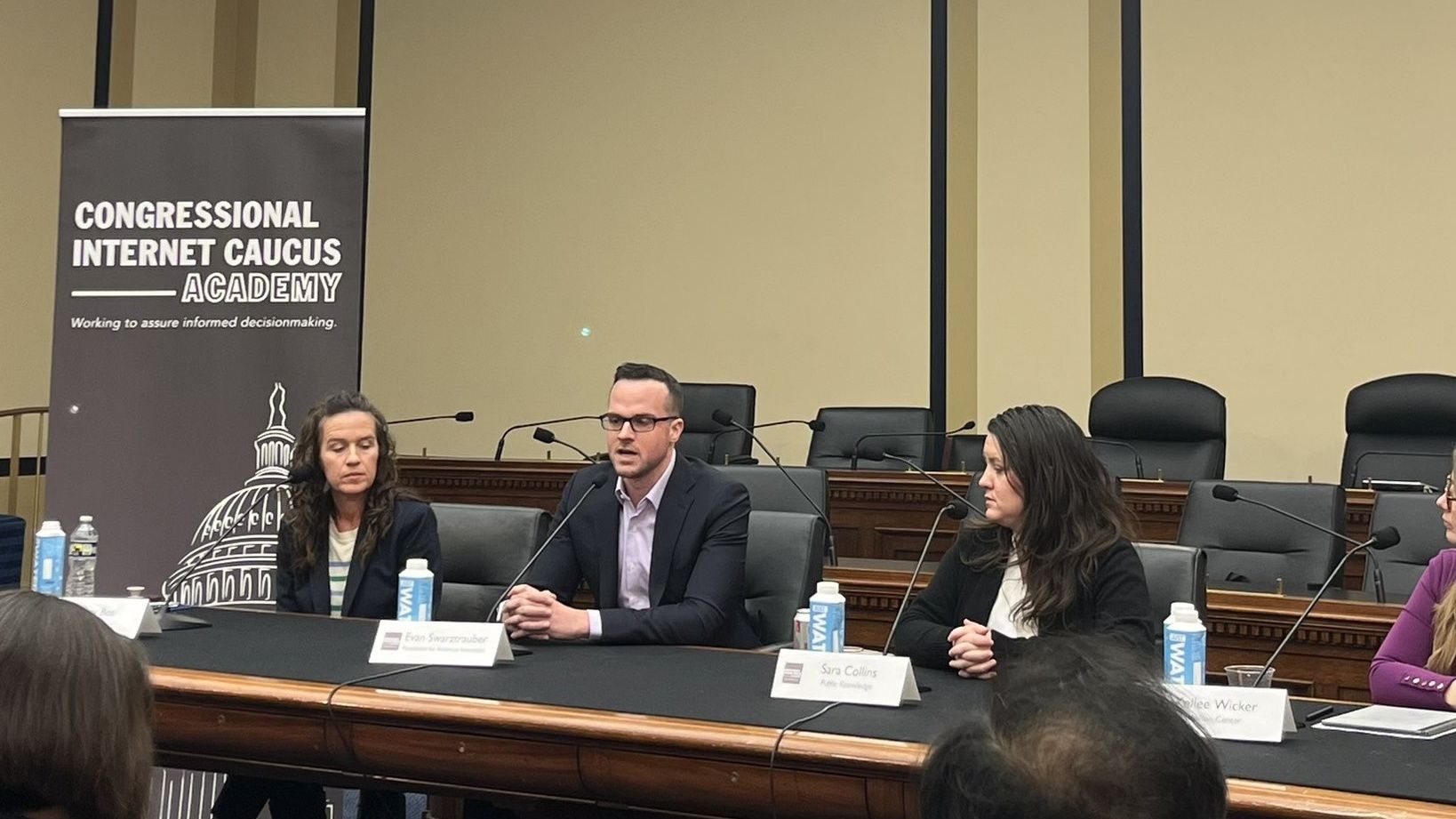
- James spoke at a Business for America webinar about “A New Political Reality: The Trump 2.0 Administration.”
- James spoke at two workshops on congressional process and procedure hosted by Georgetown’s Government Affairs Institute, focusing on the Navy and the U.S. Forest Service.
- At the Freedom Conservativism conference in DC, Dan spoke on a panel about DOGE, the Government Accountability Office, and opportunities to improve government efficiency.
- Thomas spoke at Geothermal House, a conference hosted by Project Innerspace and CRES Forum, about how to advance geothermal energy.
- Luke spoke at a lunch hosted by the Bull Moose Project about “21st Century Warfare: Software for the Front Line.”
- Jon joined the Abundance Institute for a panel on “AI, Open-Source, and the Global Race.”
Podcasts
On The Dynamist, Evan brought on some of today’s most important thinkers and doers to discuss the future of technology, governance, and innovation. Along with Y Combinator’s Garry Tan, recent episodes have featured Helion Energy’s Sachin Desai and the Institute for Progress’s Tim Fist.
On the Nuclear Barbarians podcast, Emmet discussed Galileo’s Dialogue Concerning Two Chief World Systems, the film Chinatown’s insights into the politics of energy, and more.
On Politics in Question, James considered contemporary challenges to our political institutions with his cohosts, New America’s Lee Drutman and Marquette University’s Julia Azari. Recent episodes have considered democratic participation, political scandals, and changes to our constitutional order.
Media Fellow Marshall Kosloff and Saagar Enjeti have continued hosting The Realignment, which is sponsored by FAI. They’ve had conversations in recent months with figures such as New York Times columnist Ross Douthat, Senator Chris Murphy, and Senator Ron Wyden.
What We’re Reading
The FAI team has been getting into some great books in recent months. Here are a few that members of the FAI team recommend:
- From Crossbow to H-Bomb: The Evolution of the Weapons and Tactics of Warfare, by Bernard and Fawn M. Brodie
- The Order of Time, by Carlo Rovelli
- The Lever of Riches: Technological Creativity and Economic Progress, by Joel Mokyr
- Of Human Bondage, by W. Somerset Maugham
- Abundance, by Ezra Klein and Derek Thompson
- Liberalisms: Essays in Political Philosophy, by John Gray
- Inherent Vice, by Thomas Pynchon
- Chokepoints: American Power in the Age of Economic Warfare, by Edward Fishman
- The Techno-Optimist Manifesto, by Marc Andreessen
- The Myth of American Individualism: The Protestant Origins of American Political Thought, by Barry Alan Shain
- Rethinking Merger Analysis, by Louis Kaplow
- The Technological Republic: Hard Power, Soft Belief, and the Future of the West, by Alexander C. Karp and Nicholas W. Zamiska
- Schoenberg: Why He Matters, by Harvey Sachs
- The New Organon, by Francis Bacon
- A Far Cry from Kensington, by Muriel Spark
You can also see a longer list of our recommendations on our Bookshop page.
Coming Soon
We have many projects in the works and are excited about the next few months. We’ll be publishing reports on AI’s potential threats to national security, the history of federal budget oversight, and more. We’re also planning several events: I’ll be co-chairing this September’s Abundance Conference, and in October we’re co-sponsoring the Roots of Progress conference in the Bay Area. Be on the lookout for announcements in the coming months.
Thank you for following our work. We appreciate your continued interest in FAI and welcome any questions or feedback.
Sincerely,
Zach Graves
Executive Director
Foundation for American Innovation
